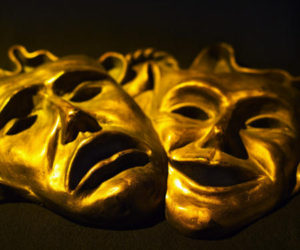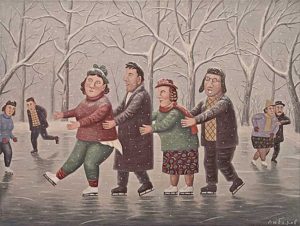 My family lived in Odessa during the Communist regime until the Soviet Union imploded in 1990 and there was nothing to hold us back from leaving. I grew up listening to grown ups share terrifying stories of hardship, poverty, and anti-Semitism, but what I remember with even better clarity are moments of communal hilarity. Many an evening was spent together with family and trusted friends exchanging well-rehearsed jokes and polishing new material. In hushed voices, everyone took turns, even the most introverted, in joke-offs that produced suffocating belly laughter and body shaking.
My family lived in Odessa during the Communist regime until the Soviet Union imploded in 1990 and there was nothing to hold us back from leaving. I grew up listening to grown ups share terrifying stories of hardship, poverty, and anti-Semitism, but what I remember with even better clarity are moments of communal hilarity. Many an evening was spent together with family and trusted friends exchanging well-rehearsed jokes and polishing new material. In hushed voices, everyone took turns, even the most introverted, in joke-offs that produced suffocating belly laughter and body shaking.
The hostility toward the Jewish community and the constant pressures on Jews as a persecuted minority did nothing to prevent moments of intense joy derived from humor and constant self-deprecation. Perhaps, making fun of oneself was a kind of inoculation from the sting of being despised. A good joke, or anekdot in Russian, was often delivered as a lament with all of the gesticulations of Tevya asking God “So what would have been so terrible if I had a small fortune?” And gallows humor from the edge of the grave was par for the course.

Culturally speaking, Odessa was the humor capital of the Soviet Union and its annual Humorin, or day of humor on April 1st, was a rare public display of howling laughter and tears. I remember my mom preparing for Humorin by studiously reading and re-reading notebooks of typed-up jokes, which were only available to those “in the know.” On April 1st, we would stroll down Primorsky Boulevard, near the seaport, where joke-tellers lined the street and pedestrians huddled close in groups to catch a laugh. Caricature artists hawked their talents to long line of tourists and pantomimes entertained the little ones. The city was alive with joy, even when there was nothing to be particularly happy about.
Amidst predictable conformity, the jokesters had insight into truth that was too difficult or dangerous to tackle head on, so they found roundabout ways to pin it down, protected by the shield of laughter. Did you hear the one about Abram who opens the door after he hears someone knocking and sees KGB in the doorway? They said, “Abram, we’ve come to arrest you.” With a wink, they offered “or you can give us something you treasure most, and we’ll part ways.” Abram yells, “Roza, my precious love, the KGB are here for you!”
My mom reminded me of a quote by Sholem Aleichem, a beloved Ukrainian Yiddish writer, “This is an ugly and mean world, and only to spite it we mustn’t weep. If you want to know, this is the constant source of my good spirit, of my humor. Not to cry, out of spite, only to laugh out of spite, only to laugh.” Humor showed courage to challenge the status quo, and satire, as a vehicle to expose the absurdity of ingrained injustice, was a way to lighten the load of a difficult life.
Jews have a long history of sarcasm and mockery, as even the Torah has some intentionally funny episodes. “There weren’t enough graves in Egypt so you brought us to die in the wilderness?” the Israelites mock Moses in Exodus 14:11. You could almost see the Israelites shrugging their shoulders and putting out their palms in utter bemusement. And when God tells Sarah that she will give birth to a son in her old age, she laughs at the idea of having sex with her husband. Hers was not a joyful chuckle, but a sarcastic chortle: “Now that I am withered, am I to have enjoyment—with my husband so old?” (Gen 18:12)
Oftentimes, we have no idea why something is funny. It is almost a primal experience, with laughter that bubbles up from the depth of our belly. On a chemical level, laughter induces endorphins, which helps us relax. Whatever it is, we can certainly use some humor in our lives right now. Maybe Solomon was onto something when he wrote in Ecclesiastes “So I commend enjoyment, for there is nothing better for people under the sun than to eat, and drink, and enjoy themselves, for this will go with them in their toil through the days of life that God gives them under the sun.”
Originally published by the Atlanta Jewish Times
This is a lovely piece about humor, your heritage, and Judaism. I love the idea of a day of humor (instead of just pranks!)! Jeff and Inare very much enjoying your blog.
When I was growing up, humor was a way to cope and a way to talk about truth. It’s interesting to see how satire and humor are being used to talk about our administration. I just watched an excellent piece about American political satire and how it is doing a better at covering the news than our news stations.
Loved reading this. You always capture a scene, a feeling, a way to connect and keep smiling in your writing. Keep posting. We all need your wisdom.